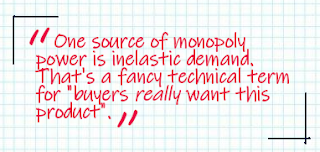Fundamentals: Monopoly Power

Definitions Technical definition : Monopoly power is the ability of a seller to push the market price of their product above their marginal cost (MC). (Source: Xplaind.com ) Non-Technical Definition : The ability of a firm to influence the price at which it sells its product. Commentary Folks who haven't studied Economics (and even many who have) often stumble over the concept of monopoly power. It's easy to see why -- it sounds like a superpower that should belong exclusively to the monopolist. In fact, it's not exclusive to the monopolist and it can be very useful to learn about and study. Monopoly power is all around us, every day. I should point out here that "monopoly power" is synonymous with "market power". I also want to point out that the field of Law has it's own definition of "monopoly power" that may not correspond exactly with that of the field of Economics. Here we are only discussing the definition(s) used in the field of E...

